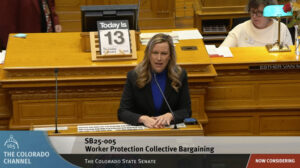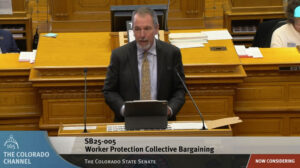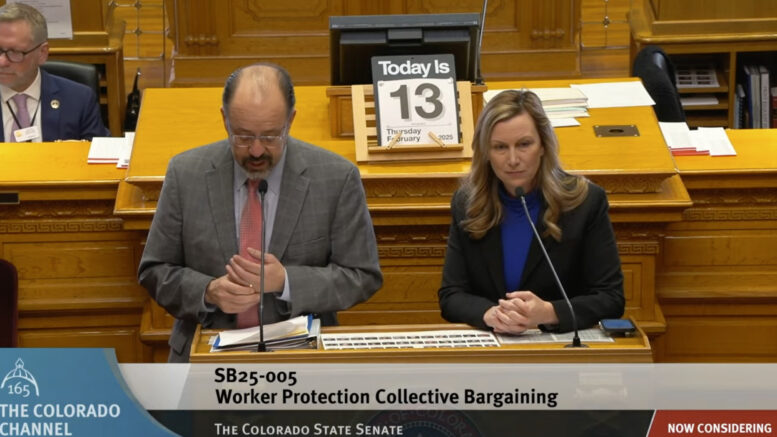A significant change to Colorado’s 82-year-old Labor Peace Act is now halfway to Gov. Jared Polis’ desk, as Senate Democrats approved it along party lines Tuesday after two days of debate on the subject.
Senate Bill 5 would remove a provision in Colorado law pertaining to union organizing that makes it unique from the 26 right-to-work states and the 23 right-to-organize states — and, business leaders say, gives it a leg up in attracting company expansions and relocations. That provision, which comes only after workers decide by simple majority if they want to organize in a union, requires 75% approval in a second vote for unions to be able to take negotiating or “agency” fees out of the paychecks of each company employee.
Leaders of the Colorado AFL-CIO and other worker-advocacy groups proposed the change two weeks after the November election, saying that legislators needed to do more to help the working class, and it became the first bill to get a hearing in the Senate this year. Since Jan. 21, it’s moved through two committee and the Senate on party-line votes, dividing opponents who say that current law balances worker and employer concerns from supporters who say that law standing in the way of greater private-sector unionization.
Bill has spurred intense negotiations
All that time, business and labor groups have been meeting to see if there is a compromise position that can be found, particularly as Polis, a Democrat, has said he is leery of approving any change that is not negotiated by the two camps.
But those talks failed to lead to any changes that sponsoring Democratic Sens. Robert Rodriguez and Jessie Danielson deemed acceptable. Democrats rejected eight proposed Republican amendments during debate Thursday, including efforts to let dissenting workers opt of paying for union representation and a proposal to require unions to detail to workers who they are spending the agency fees.
Danielson, of Wheat Ridge, reiterated that she believes greater unionization — Colorado’s 6.9% organizing rate among private companies is the lowest of any non-right-to-work state — will lead to pay bumps, better benefits and safety improvements across the state. And she said she and Rodriguez, the Senate majority leader from Denver, opted to push the bill now because they’ve heard too often from constituents that they are struggling to make ends meet.

State Sen. Jessie Danielson speaks Thursday for a proposal to overhaul the Colorado Labor Peace Act.
“I understand that the corporate lobby is opposed to this … I understand that (opposition) is what some business owners believe is best for the workers,” Danielson said shortly before the final vote on Tuesday. “But that’s not what workers are saying. And I’m going to stand with those workers.”
“Reasonable proposals were rejected”
The bill passed by 22-12 vote, with all Democrats backing it and all Republicans opposing it. While there are normally 23 Democrats in the Senate, embattled Sen. Sonya Jaquez Lewis, D-Longmont, announced her resignation from the Senate earlier in the day.
A coalition of business groups expressed deep frustration after the vote, saying they have made sincere efforts to find middle ground but have been rebuffed. That coalition includes groups such as the Associated General Contractors, Colorado Chamber of Commerce, Colorado Contractors Association and Colorado Restaurant Association.
“Over the last few weeks, the Colorado Chamber and our coalition partners … came to the table to try and find compromise with labor groups to preserve worker choice in union negotiations,” Colorado Chamber President/CEO Loren Furman said. “Unfortunately, our coalition’s reasonable proposals were rejected, and we will continue to oppose the bill as written to preserve Colorado’s economic competitiveness and protect worker paychecks.”
At the heart of the debate continue to be two central issues: What it means to protect workers and what impact SB 5 will have on a state that’s already becoming less attractive to employers because of high costs and increasing regulations.
Would change to Labor Peace Act hurt economy?
Rodriguez and Danielson both cited worker testimony from a Jan. 21 committee hearing that, after voting in the first election to unionize, they were subject to increasing harassment from management over the extended period before the second election. While workers have met the 75% bar to include paycheck deductions in negotiations in 70% of elections over the past 48 years, organizers say the time, expense and backlash has reduced the willingness of unions and workers to proceed with many such elections.
Reducing the bar to where a slim majority of workers can force paycheck deductions for cohorts who want no part of a union is not helping workers but taking away their freedom on how they want to spend their wages, Senate Minority Leader Paul Lundeen said. And increasing funded union activity will drive up wages that already are above the national average, which in turn will boost costs of goods and services and further reduce chances that companies will move here or expand here, the Monument Republican said.
Sen. Barbara Kirkmeyer, R-Brighton, pointed to a National Bureau of Economic Research study showing employers experience a 10% to 14% average drop in returns on investment after their workforce organizes, and she noted agency fees can take 2% of workers’ pay. These impacts are not beneficial to workers or employers, she and other Republicans said.

Colorado Senate Minority Leader Paul Lundeen speaks Thursday against a bill to overhaul the Colorado Labor Peace Act.
“It would send shockwaves through Colorado’s small businesses, construction companies and service industries,” Lundeen warned about elimination of the second election and increased unionization efforts. “Companies will leave Colorado, choosing to invest in states where they have more flexibility in managing their team, their labor force.”
Sponsor calls Labor Peace Act anachronistic
Rodriguez pushed back by noting that the Labor Peace Act, passed in 1943, was a remnant of a time of societal division and wartime pushback against labor and inserts government into the relationship between employers and their workers as arbiters of the second vote. And where Kirkmeyer criticized unionization as reducing business returns by 10%, Rodriguez said workers will see that as an opportunity to boost paychecks by 10%.
“It’s the backs of the workers that we’re willing to take that from,” Rodriguez said. “I don’t think it’s a target for us to say, ‘Come to Colorado because your workers can have less rights.”
There is no timeframe yet for SB 5 to receive its first hearing in the House. However, sponsors of the bill also have given no indication that they want to slow the fast track that it’s been on since its introduction on opening day of the 2025 session.
